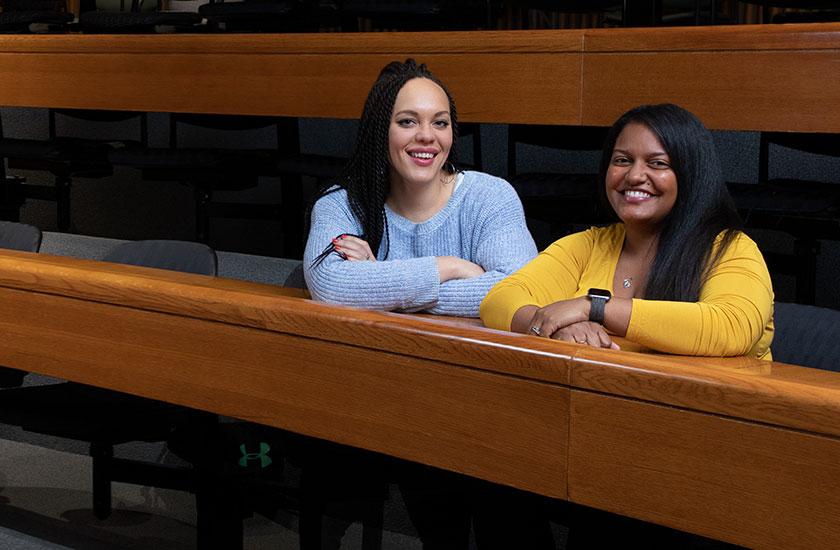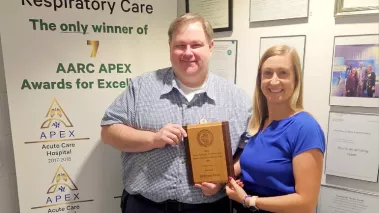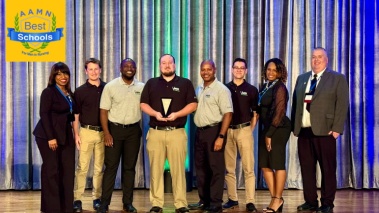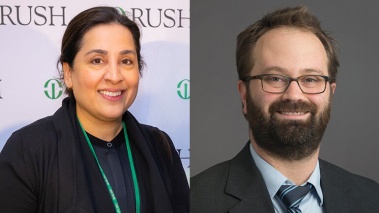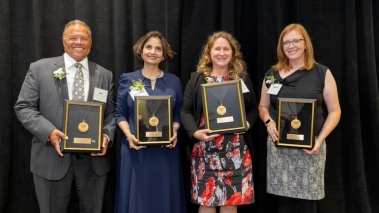As it turns out, convincing people to switch from their usual diet of fried food and soda to spinach and parsnips often has its hurdles. Coaxing healthy food changes may first require a change of plans.
Rush University College of Nursing students Brittany Davis and Tara Spears learned that lesson quickly when they helped run a nutrition course for residents at Oakley Square Apartments, a low-income housing development on Chicago’s West Side. The two second-year Generalist Entry Master’s students talked about that experience, learning to meet people in the middle and what drove them to pursue nursing.
Tell us about your background.
Brittany Davis: I was born and raised in upstate New York, Rochester, and I went to college at the University of Rochester. I earned a bachelor’s degree in biochemistry and American sign language, and I thought about going to medical school. But when I graduated, I decided to drop those plans and move to Chicago on a whim. I still wanted to do something in a health-related field and landed an internship with the Chicago Women's Health Center working in the outreach and education department. They eventually asked me to teach sex education there, so I did that for a year and a half.
I loved my time there, but I knew I needed more education for what I really wanted to do. A friend talked to me about nursing, and a light bulb went off in my head. I was like, “That's it! That's what I'm going to do.”
Tara Spears: I was born in Brooklyn but grew up in Michigan. We moved around quite a bit. I moved to Chicago after high school, and I've been here ever since. Nursing is actually a second career for me. I earned my bachelor’s in psychology from Loyola in 2007.
Like Britney, I was also considering medical school. I even took the MCAT and shadowed some physicians. I decided to go in a different direction and made the decision to go back to school. I shadowed nurses and nurse practitioners and volunteered at hospitals. That’s really what led to my decision to become a nurse.
What was it about nursing that drew you in?
Brittany: Nursing just fits so well with my personality — things like communication and anticipating people's needs and cultural awareness. Those are skills nurses need every single day, and they are things I’ve been doing naturally my entire life. I’m just so happy I found this field. It feels so right.
Tara: My mom was a nurse and what made me follow in her footsteps is my experience shadowing nurses, who are really front and center with the patient and helping to make a difference. I want to make an impact, so I knew this was the career for me.
Why did you choose Rush to fulfill your dreams?
Brittany: Rush has a great reputation. I also have close friends affiliated with Rush. One is a physician, and his wife is a nurse practitioner. Their daughter recently completed her DNP dissertation at Rush. That whole family and their feelings about Rush definitely pulled me here.
There were only two programs I really considered. At the information sessions at both schools, it was clear that the caliber of faculty, students and nurses at Rush were just far superior. I'm a very competitive person, so I wanted to go to the best program and get the best education so I can be prepared to do the things I want to do.
Tara: I was accepted to Rush and immediately knew I wouldn’t consider anywhere else. That was it. I wanted to go somewhere reputable. I wanted somewhere that would give me the education I needed to be successful and become a leader. The curriculum at Rush is allowing me to do that.
Beyond that, there’s the community service component. When I was researching, I saw how active Rush is in the community. That was really important to me because I have always volunteered to reach back and help others.
And you both have taken full advantage of those community opportunities. Tell us about the program you’re involved in at Oakley Square.
Brittany: Top Box Foods, a non-profit that tries to make healthy foods accessible to the underserved in the West and South Sides, wanted to run a nutrition and cooking class for the residents at Oakley Square Apartments. Tara and I both love cooking. I've always wanted to incorporate nutrition and healthy eating into what I was doing in school.
We decided on a six-week program of once-a-week, 90-minute nutrition and cooking classes. We gave classes about portion control, having a balanced plate, processed foods, food safety, food waste and healthy cooking techniques in general.
Tara: It was convenient because Rush already has a community service relationship with the Oakley Square Apartments. They already had relationships with the students, which really helped facilitate everything.
Giving back to underserved communities seems important to both of you.
Tara: For me, it’s very personal. I was a person who needed that help. Childhood wasn't an easy time. My mom had three jobs, and my sister and I would help out. We got extra help where we needed it. I don't think I would be where I am today if it wasn't for that.
Brittany: Like Tara, the underserved communities I help now are very familiar places to me. It reminds me of how my parents grew up the same way. It really makes me check my privilege, knowing my parents worked hard to give me the resources and the education that aren't necessarily available in these communities. They worked hard to give me those things, boost me up and make me the successful person I am today. So it's important to me to give back to people who are in spaces that are familiar to me.
What has been your greatest takeaway from your work at Oakley Square?
Brittany: You have to meet people in the middle to make lifestyle changes. You're not going to completely revolutionize someone's life with a six-week program, but if you can help them develop some skills and pick up healthy habits they can use throughout life, that helps lead to greater overall health. People aren’t going to just stop eating those chips. You're going to say, “Hey, let's make some homemade tortilla chips and salsa instead of eating that bag of Doritos.” Little by little, they pick up habits that help transition them into better overall health. It has to be practical.
Tara: Yes, you have to start with baby steps. I can't say all of the recipes we gave them were embraced, but we adjusted. For example, they eat a lot of fried food, so we would make chicken tenders that were crispy but baked in the oven rather than fried. And instead of a blue cheese dip we used Greek yogurt to make a dill sauce they loved.
Brittany: At the beginning we were maybe trying to give them, for example, way too much spinach. They would ask, “Do we have to finish all of this spinach?” And I said, “You're right, maybe you don't have to eat that much spinach!” Maybe they’re not ready for parsnips right away. It became about cooking food they like — only in a healthier way.

